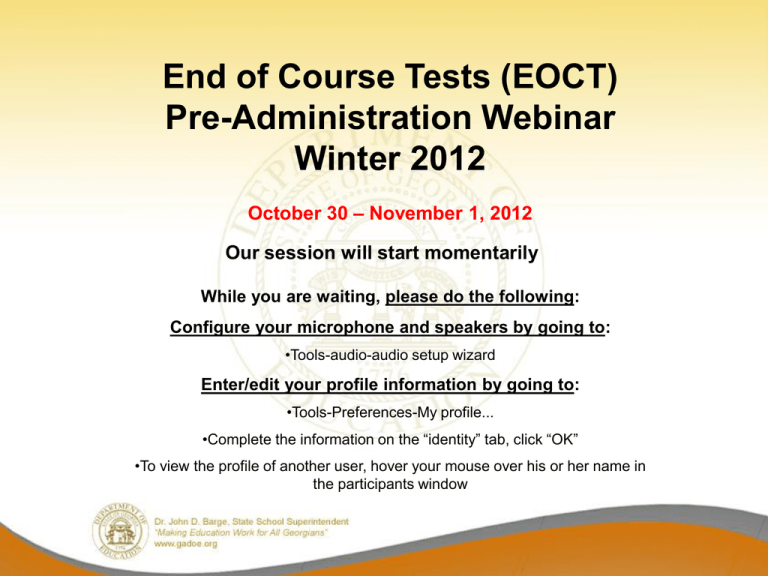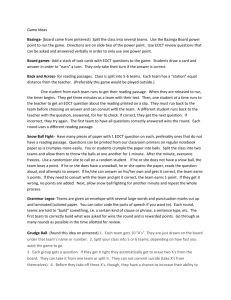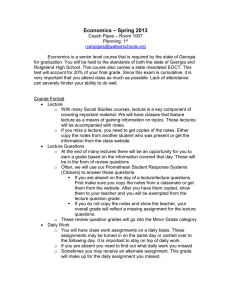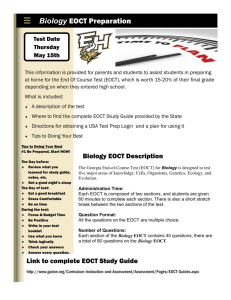EOCT Pre-Administration Presentation Winter 2012
advertisement

End of Course Tests (EOCT) Pre-Administration Webinar Winter 2012 October 30 – November 1, 2012 Our session will start momentarily While you are waiting, please do the following: Configure your microphone and speakers by going to: •Tools-audio-audio setup wizard Enter/edit your profile information by going to: •Tools-Preferences-My profile... •Complete the information on the “identity” tab, click “OK” •To view the profile of another user, hover your mouse over his or her name in the participants window • • • • • • • • • • • • • AGENDA Introductions What’s New/Reminders Purpose/Overview Use of Calculators Scheduling Considerations/Test Makeup Procedures Students to Be Tested/Accommodations Grading Security/Testing Irregularities Receipt, Return and Tracking of Materials Scores and Reports EOCT Important Dates EOCT Resources Contact Information What’s New/Reminders • • • • • Transition to CCGPS Standards: Mathematics & English/Language Arts PearsonAccess Student Upload Feature Electronic Individual Student Reports (ISRs) Delivery Dates of Testing Materials System Readiness Tools CCGPS Transition • Beginning in the 2012-2013 school year, we have transitioned to CCGPS standards • Mathematics – Introduce a new Coordinate Algebra EOCT beginning with Winter 2012 administration – Standard Setting will be held December 18-19 – Scores will post in early January and will serve as the final exam – This is not a field test or pilot • English/Language Arts – Ninth Grade and American Literature aligned with new CCGPS standards beginning with Winter 2012 administration • Field Test Items for inclusion on new forms – Completed in Spring 2012 – Continuing in Winter 2012 PearsonAccess – Student Upload When entering student data into PearsonAccess (either manually or via SDU Upload) . . . • It is critical that BOTH the FTE Number and GTID fields are completed. • Not doing so could complicate Assessment Processing functions that are required for accountability purposes. Electronic ISRs • Electronic ISRs will be posted on PearsonAccess, regardless of whether or not districts request paper copies – Access to electronic copies “indefinitely” • Please note that districts who have not previously requested electronic copies will not have access to files prior to the Winter 2012 administration – Districts may download these files for their records Staggered Delivery of Testing Materials Three test material delivery dates: • • • Systems testing the weeks of November 26th and December 3rd November 12th-14th Systems testing the weeks of December 10th and December 17th November 26th-27th Systems testing the weeks of December 24th & December 31st December 10th-11th Online Testing – System Readiness Tools Additional resources available for districts to enhance the online testing experience. • System Readiness Tools: System Checks Infrastructure Trial One-on-one training EOCT Overview 3/23/2016 9 Purpose • The purpose of the EOCT is to assess student achievement of the state adopted curriculum in core courses and to provide diagnostic data in support of improved student achievement. • The EOCT serves as a component in Georgia’s College & Career Readiness Performance Index (CCRPI). EOCT Assessments • • • • • • • • • • • Ninth Grade Literature and Composition American Literature and Composition Biology Physical Science U. S. History Economics/Business/Free Enterprise GPS Algebra GPS Geometry Mathematics I: Algebra/Geometry/Statistics Mathematics II: Geometry/Algebra II/Statistics CCGPS Coordinate Algebra EOCT Assessments • Each test booklet is divided into two sections. • Students may complete Sections I and II in day one or Section I in day one and Section II in day two. • Students may not complete a portion of a section and then complete the remainder of the section later in the day or the next day. • This will result in an invalidation of the test. – For example, if a student becomes ill during Section I and does not complete that section, the student may not complete the remainder of the Section I upon return to school. EOCT Courses Course ID Course Name Corresponding EOCT 23.06100 23.05100 23.05300 23.06800 26.01200 26.01400 26.01800 26.01900 45.06100 45.06200 45.06300 45.06500 27.08100 27.09100 27.08200 27.09200 40.01100 45.08100 45.08200 45.08700 27.06210 27.06220 27.09400 27.09500 9th Literature and Comp Am Literature and Comp AP Language Comp (American Lit Comp) IB English SL (Am Lit) Biology I Advanced Biology (AP) IB Biology SL IB Biology HL General Economics AP Macro AP Micro IB Economics SL Mathematics I Accelerated Mathematics I Mathematics II Accelerated Mathematics II Physical Science General US History AP US History IB History of Americas SL GPS Algebra GPS Geometry Accelerated GPS Algebra/Geometry Accelerated GPS Geometry/Advanced Algebra 9thLit AMELit AMELit AMELit BIO BIO BIO BIO ECO ECO ECO ECO MATH 1 MATH 1 MATH 2 MATH 2 PHY USH USH USH GPS Algebra GPS Geometry GPS Algebra GPS Geometry 27.09710 27.09750 CCGPS Coordinate Algebra Accelerated CCGPS Coordinate Algebra/Analytic Geometry CCGPS Coordinate Algebra CCGPS Coordinate Algebra Administration Windows • Main administrations: • Winter 2012 • Spring 2013 • Summer 2013 • Mid-months: • Spring 2013- January, February and March • Fall 2013 - August, September, October and November • Retest Administrations: • Winter Retest Administration will coincide with the Spring Mid-month administrations. Testing Modes • End-of-Course Tests may be administered via paper and pencil or online. – Paper/ pencil assessments available during the winter, spring and summer administrations. – Online assessments are available for all administrations (including retest administrations). Use of Calculators • Calculators are allowed to be used on the following EOCTs: – – – – – CCGPS Coordinate Algebra GPS Algebra/GPS Geometry Mathematics I/Mathematics II Physical Science Economics • Calculators that store text or graphing calculators cannot be used. – Examiners should verify appropriate calculator use prior to the beginning of testing. • Electronic testing format provides “4-function” calculators. – Students are allowed to use their own calculators when testing online. Scheduling Considerations • Diligent attention must be given to the development of a schedule that protects the security and integrity of the test administration. • EOCT may be scheduled at any time during the state testing window. – Systems may elect a one-day or a two-day administration; however, all schools in the system must follow the same schedule as closely as possible. – Individual subject areas must be administered on the same or consecutive days within the system. – At no time should some students complete a test one week and another group of students complete the same test the following week. – For scheduling examples, please refer to Page 66 of the Student Assessment Handbook. *Allowing flexibility in the scheduling of the EOCT, to meet the variety of school schedules that exist, is dependent upon everyone involved in the administration protecting the integrity of the program. Scheduling Considerations • Schools must adhere to the testing times prescribed in the Examiner’s Manuals. – Total administration time for the tests is 90-120 minutes. – Additional time is required for disseminating materials, completing forms, and other test protocols. – Allowing too much or too little time may result in an invalidation. • When scheduling tests, consider the optimum time to administer the tests. – Consider logistics, including time and staffing. – During one-day test administrations, lunch should not serve as the break between sections I and II. To do so, would allow for potential breaches of test security. Scheduling Considerations – Test Make-ups • The purpose of the make-up days is to administer the tests to students who are unexpectedly absent during the regularly scheduled administration. – Include sick days, verified court dates, etc. – Does not include personal vacations, school field trips. – When in doubt, contact GaDOE. • Make-ups must only be administered during the district’s window – Permission to test outside district window will only be considered in rare, case-by-case circumstances and must be pre-approved by GaDOE. Students To Be Tested • Any student, regardless of grade-level, enrolled in an EOCT course must take the appropriate EOCT. – For example, if a student is taking a course to complete the state requirement for Mathematics I, that student must take the Mathematics I EOCT, regardless of the course title assigned by the local system. Students To Be Tested • Students who are: – taking a block-scheduled course who complete the full year course in one semester will be tested at the end of that semester. – following a traditionally scheduled (36-week) course will be tested at the end of the second semester of the course. – completing a course at the end of one semester (typically Economics) will be tested at the completion of the course. Students To Be Tested • Students enrolled (or dually enrolled) in: – alternative schools. – credit recovery or “make-up” courses. – college courses, online courses, or correspondence classes and are receiving credit towards graduation for an EOCT course. • Note: High schools are responsible for determining that postsecondary courses meet the criteria for dual enrollment. Scores will be counted as follows: 1)The college instructor must issue a numeric grade for the student. A letter grade may also be issued, but the high school must receive a numeric score for the course. 2)For high school credit, the course grade will be determined using the State Board approved calculation. Students To Be Tested • Middle School students enrolled in an EOCT course, whether or not they receive HS credit for the class. – These students are also required to take the appropriate CRCT. • Students with disabilities and English Learners (EL) who are enrolled in EOCT courses for credit. – Students who receive accommodations for instructional and classroom assessment purposes may also be eligible for accommodations during the administration of End-of-Course Tests. – Accommodations provided for statewide assessment must be listed on IEP, IAP, or EL TPC and should be consistent with the student’s instructional program. Students To Be Tested • Students enrolled in your system who are also enrolled in EOCT courses via Georgia Virtual School (GAVS) – Must be administered the appropriate EOCT at their home school. – It is the school test coordinator’s responsibility to ensure that these students’ answer documents are coded accurately (“30” under SDU A) so that results may be reported to GAVS. – Documents not coded to reflect students enrollment with GAVS could delay or interfere with student grade reports. Students To Be Tested • Students enrolling from non-accredited programs. – Must take and pass the EOCT with a minimum of 70 grade conversion score to receive credit for the course. – It is the responsibility of the local school system to determine whether criteria are met for awarding credit. Students NOT To Be Tested • Students who wish to transfer credit in an EOCT course completed at an accredited institution. – Note: Students who enroll in coursework at another accredited institution while also enrolled in a public school are considered “dually enrolled.” • Students who have previously taken an EOCT course, took the accompanying EOCT and received core credit for the course. – For example, if a student is completing an EOCT course as an “elective”, the student would not be required to take the EOCT. The student is required to take the EOCT when they take and complete the course for “core” credit. – If you have questions in such circumstances, please contact GaDOE Assessment. Accommodations • Students who receive accommodations for instructional and classroom assessment purposes may also be eligible for accommodations during testing. – Accommodations provided for statewide assessment must be listed on IEP, IAP, or EL TPC and should be consistent with the student’s instructional program. • To avoid an irregularity, please ensure that students who should receive accommodations are properly identified prior to testing. Accommodations • Only approved accommodations may be used. – Please refer to the Accommodations Manual and the Student Assessment Handbook. • Use of accommodations not on the list must be approved in advance by Melissa Fincher, Associate Superintendent for Assessment and Accountability. – Four to six weeks should be allowed for these requests to be reviewed. What percentage of a student’s course grade does an EOCT comprise? Cohort 1 Cohort 2 Students who enter grade 9 for the first time in SY2011 -2012 or after Students who entered grade 9 for the first time between July 2008 and June 2011 • EOCT counts as 20% of course grade • EOCT counts as 15% of course grade The percentages for these two cohorts are defined by State Board of Education rule 160-4-2-.13 (STATEWIDE PASSING SCORE) Grading • Students must earn a 70 or higher final course grade to pass the course and earn credit for graduation. • If your school awards 1.0 credit upon completion of a year long course, the EOCT should count as either 15% or 20% that final grade. • If your school awards 0.5 credit at the end of the first semester, and 0.5 credit at the end of the second semester, the EOCT should count as either 15% or 20% of the final second semester course grade. Grading • If a student is not present for an EOCT administration (main or midmonth), the system may issue an Incomplete and allow the student to test during a future testing window (main or mid-month). – This Incomplete may remain as the student’s course grade until their testing requirement is fulfilled. • If, after attempts have been made to have the student test in a future window, the student does not take the EOCT, the course grade shall reflect that the student did not participate in the test. – The system may issue a zero as 15% or 20% (dependent upon date first enrolled in grade nine) of the final course grade. – There should be sufficient documentation to indicate the student was notified of testing opportunities and did not participate. • The EOCT is Georgia's assessment utilized for federal high school accountability. As a result, systems must provide for the participation of all students in completion of an EOCT course. Security • Maintaining test security and test integrity is critical. • All EOCT must be administered and supervised by a Georgia-certified educator. • Everyone involved in the testing process must be properly trained and informed of their roles and responsibilities for test security. – Attendance at training must be mandatory and well-documented. – Untrained examiners must not be allowed to test. • Students and teachers need to understand test protocols and the ramifications of not following testing procedures. • The school principal must be made aware of any issues involving testing or test security. • Violations may result in invalidation of students’ tests and/or referral to the Professional Standards Commission for disciplinary action. Security • Student Test Booklets must be kept stored in a secure place accessible only by the principal and the test coordinator at all times. • Test materials must not be removed from their secure storage location for reasons other than the preparation of materials for testing, actual test administration, and the completion of tasks as prescribed by test manuals. • Shrink-wrapped packages must remain sealed until Test Coordinators are ready to prepare test materials for administration. • Distribute testing materials as close to the actual testing time as possible. • Testing materials should only be issued to persons who have been carefully advised of their responsibilities for test security. – Only staff members who have been trained on the proper management of secure test materials should handle such materials. Security • All persons receiving testing materials must sign a checkout sheet when they receive the materials. This sheet should show date and time. • All testing materials issued to persons administering tests must be counted carefully when given out and when returned. – If a problem occurs, School Test Coordinator should be notified immediately. • Test Coordinators and/or Examiners should keep a record of all students tested for each EOCT administration. • In addition to student’s name and EOCT administered, please remember to include form numbers for each student in your documentation. Please be sure to keep copies of these records. Security • Students must write their names on the cover of their test booklet and any scratch paper. • Please follow all instructions in the test manuals exactly. – Do not add anything to, or delete anything from, the directions in the test manual. This violates standardized test conditions and may invalidate scores. • All testing materials must be collected and returned immediately after the testing session. – Please be reminded that Student Authorization Tickets and used scratch paper are considered secured materials and must be handled as such. – Examiners are responsible for turning them in and coordinators are responsible for verifying that they do. • For additional security information, please refer to pages 35-37 of the Student Assessment Handbook. Security - Examiner Training • Documentation of attendance at the district and building level (include agenda and materials used). • Ensure examiners have an opportunity to review examiner manual prior to testing date (in a secure environment). – Updated manuals have also been posted on the GaDOE (EOCT) website. • Examiners should be clear on logistical procedures in place for security of materials. Testing Irregularities • All personnel in the local system must follow protocol as they become aware of testing irregularities. • Signs of any testing irregularity must be dealt with immediately. – Test Examiner > School Test Coordinator > System Test Coordinator > Melissa Faux • The school principal must also be made aware of any instances of a testing irregularity. • Reports of testing irregularities from persons other than the STC (or their designee), will be referred to the STC to ensure proper reporting protocols are followed. • Please do not include identifiable student information such as, social security numbers, GTID, or FTE numbers in emails sent to GaDOE. Testing Irregularities • All irregularities must be coded, documentation completed and submitted on the Testing Irregularity Form in the MyGaDOE Portal. • When entering the documentation into the portal, please: – Select the appropriate “Administration Cycle” - Winter 2012. – Select the appropriate “Administration” - EOCT Main. – Include the form number of the test that needs to be coded as an Irregularity or Invalidation. • Failure to include the form number when completing the Testing Irregularity Form will result in delayed and/or inaccurate reporting of scores. Testing Irregularities • When entering the documentation into the portal, please: – Clearly indicate if a score should be invalidated, or counted as an irregularity. • If tests needs to be invalidated, please select from drop down menu the reason for invalidation. – Described in detail the circumstances surrounding the reason for invalidating the test. Testing Irregularities • In addition to entering irregularities into the portal, once IRR or INV codes are received, you MUST: • Grid and bubble student answer documents (if the test was administered via paper/pencil) OR • Enter code into PearsonAccess (if the test was administered online) • Once received, IRR codes can be used on all future irregularities but documentation must be entered into the portal. • Only the GaDOE may invalidate assessments. Testing Irregularities - Paper • On answer documents, you must: – Fill-in the appropriate irregularity or invalidation bubble. – Grid the 5-digit SDU B code. – Failure to grid both the correct SDU-B code and fill-in the correct corresponding bubble will result in the delayed and/or inaccurate reporting of scores. Testing Irregularities – Online • For students who test online, follow these steps in PearsonAccess: 1. Click on Test Management. Testing Irregularities – Online 2. Find and Select the student 3/23/2016 43 Testing Irregularities – Online 3. Once you find the student, click on Assigned Tests: 3/23/2016 44 Testing Irregularities – Online 4. Select the Subject: 3/23/2016 45 Testing Irregularities – Online 5. To enter the SDU B code, click on the Edit button. 3/23/2016 46 Testing Irregularities – Online 6. Select ‘Yes’ by using the drop down options for either the Irregularity, Invalidation or PIV box. 7. Enter the 5-digit SDU-B code. Failure to select ‘yes’ for the correct indicator (Irregularity/Invalidation/PIV) and/or failure to enter the correct corresponding SDU-B code will result in the delayed and/or inaccurate reporting of scores. 3/23/2016 47 Testing Irregularities – Irregularity/Invalidation Matrix Bubble Irregularity Code Score INV INV IRR IRR No Bubble No Bubble Valid IRR code No code Valid INV code No code Valid INV code Valid IRR code Invalidated Scored As Is Invalidated Scored As Is Invalidated Scored as an IRR Failure to grid both the correct SDU-B code and fill-in the correct corresponding bubble will result in action listed in the right-hand column. Testing Irregularities Some examples of irregularities: • Cheating – Following an investigation and confirmation student test scores will be invalidated by GaDOE – If the incident involves improper conduct on the part of staff, a referral to the Professional Standards Commission for disciplinary action may result • Using a graphing calculator or other prohibited devices – Following confirmation of the use of a prohibited device during a testing administration, student scores will be invalidated by GaDOE Testing Irregularities Some examples of irregularities: • Sickness during testing administration – Student gets sick prior to starting the test • Upon return to school student will complete the test in its entirety and test is scored as is; does not require portal entry • If testing online, please do not “submit” the student’s answers – Student gets sick after having completed Section I but before starting Section II • Upon return to school student will complete Section II of the test and test is coded as an irregularity; requires portal entry – Student gets sick while testing in either Section I or II • Test scores are invalidated by GaDOE; requires portal entry Testing Irregularities Some examples of irregularities: • Accommodations – Students given the wrong accommodation or not given their accommodation • Test scores may be invalidated by GaDOE • School or system notifies parent (as soon as possible) • Requires portal entry – Students refuse their accommodation • School or system notifies parent (prior to the beginning of testing if at all possible) • Test scores are coded as an irregularity; requires portal entry • Please fill in the Accommodations code on student answer document or on PearsonAccess since the school attempted to provide the accommodation (See next slide) Student Answer Document PearsonAccess Select ‘Yes’ by using the drop down options for a possible selection for each accommodation. Testing Irregularities Some examples of irregularities: • Testing the wrong student or subject area – Students given the wrong EOCT • Test scores are invalidated by GaDOE; requires portal entry – Students testing under wrong GTID • Contact GaDOE as soon as possible – Much easier to fix during the administration or within the first 48 hours after the close of the administration Tips to Avoid Testing Irregularities • • • • Adhere to test security policies, protocols and procedures. Reinforce the use of active monitoring in testing environments. Immediately report any possible testing irregularities. Properly identify all students who should receive accommodations prior to testing. • Students IEP/IAP/TPC plans should be regularly reviewed to determine if accommodations are still appropriate or needed. • If a student is suspected of cheating but there is no proof of his or her action, allow the student to complete the section and/or entire test. – An invalidation can always occur after all of the facts are collected. • Have a plan in place to quickly secure testing environments and/or materials in the event of an evacuation during a testing administration. Tips to Avoid Testing Irregularities For Online Testing • Please use the system readiness tools to monitor the district’s network infrastructure and capability prior to and during testing. • If you encounter connectivity issues – prior to the start of testing, please use your best judgment as to whether or not to allow students to begin testing – during Section I testing, please use your best judgment as to whether or not to allow students to continue on to Section II • Student Authorization Tickets must be used to verify student name and GTID prior to testing. Student Authorization Ticket Students must verify and sign their names Allb Allcorrect To avoid a student testing under another student’s GTID, you must : 1. Print ALL Student Authorization Tickets; 2. Have students verify AND sign their names BEFORE testing begins Receipt of Materials • Materials will be delivered on one of three distribution dates. • System Test Coordinators must: – Ensure sufficient quantities of materials are provided for each school. – Locate pickup/return instructions, memo, return labels, and airbills/bills of lading. – For any discrepancies, contact Pearson Customer Call Center at 888705-9414. • School Test Coordinators should sign for materials and verify counts. – Upon receipt use security checklist (found in shipment) to inventory all materials. Please document any discrepancies in the portal. • Test Examiners should sign for materials and verify counts. Receipt of Materials Three test material delivery dates: • Systems testing the weeks of November 26th and December 3rd November 12th-14th • Systems testing the weeks of December 10th and December 17th November 26th-27th • Systems testing the weeks of December 24th & December 31st December 10th-11th Receipt of Materials • • Delivery dates are dictated by the testing dates originally entered in PearsonAccess. Additional orders will not be approved and shipped until the system has received their initial shipment. Answer Documents • Please place Pre-ID Labels in box located at the bottom left hand corner of answer document. – Please do not submit documents with labels placed incorrectly on answer document; this may delay scoring. • For students without Pre-ID Labels, all demographic information must be bubbled. Answer Documents Complete the following sections with or without Pre-ID labels DOB – Century Indicator Place Pre-ID Label here Answer Documents FOR TEACHER USE ONLY Complete Following Sections Only if Applicable • SRC must be coded for students with IEP, EL/TPC, or 504 IAP, with or without accommodations • Types of accommodations: – – – – S – Setting P – Presentation R – Response SC – Scheduling • Identify basis of accommodations: – IEP, EL/TPC, or 504 IAP Answer Documents FOR TEACHER USE ONLY • If applicable, code Braille or Large Print. • The PTNA option should only be bubbled by the Examiner if a student is present and can not or will not take a test. If a student answers one question on any section of the test, PTNA should NOT be bubbled. Answer Documents SDU A & SDU B Complete Following Sections Only if Applicable State Directed Use (SDU A and SDU B) • SDU A – Code for Georgia Network for Educational and Therapeutic Support (GNETS) and Georgia Virtual School (GAVS) • SDU B – Two codes, one for Irregularity and one for Invalidation – Call Melissa Faux for code – The 5 digit SDU-B code must be gridded (paper) or entered online in addition to indicating the appropriate corresponding bubble. Class Identification Sheet Complete only one Classroom Identification Sheet per group. Class ID sheet updates: •New color •CCGPS Coordinate Algebra Results will be reported based on how answer documents are grouped behind Classroom Identification Sheets. You may group students in whatever manner meets the reporting needs of your school/system. Return of Materials Materials to be returned to Pearson: • Completed Answer Documents with Classroom ID Sheet (note: Locally scanned documents should not be returned during the testing window) • Test Booklets – Test booklets (used and unused) are bar-coded and scanned upon receipt. – Check each test booklet to ensure there are no Answer Documents in the books. • It is critical to the success of the EOCT that all documents are returned immediately after test administration. Promptly returning your materials helps ensure timely results can be returned to your system. – Failure to return secure testing materials may result in referral to the Georgia Professional Standards Commission (PSC). Return of Materials • Do NOT return the following materials to Pearson: – All manuals, unused/voided answer documents, scratch paper. These must be shredded or destroyed. • You must ensure all answer documents have been accounted for PRIOR to destroying the unused/voided documents. • Please KEEP the test booklet security checklist for your records. Return of Materials Answer Documents – Returned by UPS Overnight or K2 Logistics/AAA Cooper (larger systems). – Use Pearson’s purple return labels along with UPS airbill (purple) or K2 Logistics/AAA Cooper overnight airbill. Test Books – Returned by UPS Ground or K2 Logistics/AAA Cooper (larger systems). – Use Pearson white return labels along with UPS ground label (red) or K2 Logistics/AAA Cooper freight bill. Return of Materials – Local Scanning Districts • Winter 2012 Answer Documents will be returned during a defined window at the conclusion of the administration. • Special labels to return the local scanning answer documents will be sent in January 2013. – Please do not use labels sent during the initial distribution to return scanned documents. Tracking of Materials – To check on the status of shipments to and from Pearson follow these steps in PearsonAccess: 1. Click on the Test Setup tab: Tracking of Materials 2. Select Order Additional Materials and Tracking: Tracking of Materials 3. Select Order from Pearson or Shipments to Pearson: Scores and Reports Five day Rapid Scoring and Reporting of Class Rosters/ISR’s • Begin posting once we’ve received representative sample, are dependent upon: – accuracy of answer documents – when answer documents are shipped and received Scores and Reports Systems will receive a full set of reports for each main administration. These reports include: • Preliminary On-Demand Class Rosters (electronic onlyPearsonAccess). – – – – Available for online testers only. Includes the same data fields as the Preliminary Class Roster Report. Requested by a test administrator once a student/class submits their online test. To request the report, go to the “On Demand Reports” section of the Test Results tab on PearsonAccess. The report will post electronically to the same location. – Contains student level data for a “class.” – Each time the report is requested, it is refreshed with the most current testing information for a particular class. – Preliminary Class Rosters will still be produced. Scores and Reports • Preliminary Class Roster (electronic only-PearsonAccess) with the 5-day turnaround (Rapid Scoring). – Includes Student Name, DOB, GTID, Grade Level and Grade Conversion. – Posted electronically to the “View Published Reports” section of the Test Results tab on PearsonAccess within 5 days from the date answer documents are received for scoring. – Class Rosters will be posted once a representative sample has been received. Once Class Rosters are available, Preliminary Class Roster Reports will be removed from PearsonAccess. Scores and Reports • Class Roster Reports (electronic only-PearsonAccess) will post once a representative sample of subject areas have been received. – Once Class Rosters are posted, Preliminary Reports will be removed from PearsonAccess. – Includes Scale Score, Performance Level, Grade Conversion score, and domain level information for each student in a specific class. – Batch printing is available to print single pdf’s that contain all Class Rosters by subject for a particular day. • Posted electronically to the Test Results tab and selecting the “School” radio button. Scores and Reports • Individual Student Reports (electronic or paper if requested) – Includes Scale Score, Performance Level, Grade Conversion score. • Lexile scores will be reported on the back of ISR’s for 9th Grade Literature and American Literature – Posted electronically or sent at the end of the administration with summary reports. – One copy should be filed in the student’s permanent record and one given to student/parent. – Batch printing is available to print single pdf’s that contain all ISR’s by subject for a particular day. • Posted electronically to the Test Results tab and selecting the “School” radio button. Scores and Reports • Summary Reports (system, school and class) – Generated by subject and present summary statistics for a particular group of students. • Content Area Summary Reports (system and school) – Provides information for school, system and state at the Domain Level. • System Data File – Available on PearsonAccess once class rosters and ISR’s are available. • Posted to the Test Results tab by selecting the “System” radio button – Also posted to GaDOE portal at the time summary reports are posted. Scores and Reports • EOCT scores must be included on or with students’ report cards. • If student report labels were ordered, they are to be placed on students’ permanent record folder. – Systems may request these labels on the PearsonAccess Administration Details page during each enrollment period. Scores and Reports Delays in Scoring and Reporting Late shipping Errors in packing documents for return Errors in coding answer documents Invalid/incorrect or no form numbers Labels placed incorrectly on answer document Bent/folded or torn answer document Stray marks Students administered the same test twice Important Dates Task Start Date End Date November Mid-Month/Retest Online Testing November 5 November 16 Winter 2012 Main Administration November 26 January 4 Winter 2012 Materials Delivery Date – First Round November 12 November 14 Winter 2012 Materials Delivery Date – Second Round November 26 November 27 Winter 2012 Materials Delivery Date – Third Round December 10 December 11th Winter 2012 Pickup Materials from systems November 27 January 7 Spring 2013 enrollment counts entered on PearsonAccess January 2 January 18 Spring 2013 local scanning enrollment entered on PearsonAccess January 2 January 18 January Mid-Month/Retest Online Testing January 14 January 25 February Mid-Month/Retest Online Testing February 4 February 15 March Mid-Month/Retest Online Testing March 4 March 15 Spring 2013 Administration April 22 May 31 EOCT Resources • • • • • • • • • • • • • Student Assessment Handbook Georgia Assessment Calendar Test Coordinator’s Manual Examiner’s Manual/Online Examiner’s Manual Interpretive Guide Content Descriptions Content Weights Study Guides CCGPS Coordinate Algebra, GPS Algebra, GPS Geometry, Mathematics I, Mathematics II Formula Sheets Physical Science Periodic Table Physical Science Reference Sheet Online Testing System Readiness Tools User Guides found on the Support Tab of PearsonAccess 82 Contact Information Georgia Department of Education Melissa Faux Tony Eitel 404-656-5975 404-656-0478 mfaux@doe.k12.ga.us aeitel@doe.k12.ga.us Pearson Samantha Nelson 888-705-9414 x 21-6559 samantha.nelson@pearson.com Robin Jindrich-Cecil 888-705-9414 x 21-6973 robin.jindrich-cecil@pearson.com Questions? Pearson Customer Call Center 888-705-9414 georgia@support.pearson.com





